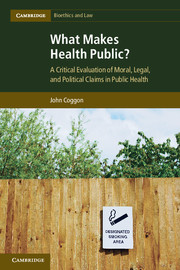 What Makes Health Public?
What Makes Health Public? from Part I - Basic concepts in public health
Published online by Cambridge University Press: 05 June 2012
Introduction
Although it only requires a short chapter, the idea of ‘public health policy’ does warrant a discrete consideration in preparation for wider critical evaluation as, especially given the great variety of meanings established of public health, it may be variously understood. In the sort of analysis I undertake in this book, and that which we find more generally in the public health and public health law and ethics literature, it is best to adopt a very broad definition of public health policy. This is a strength for present purposes, but as it may be considered a weakness, it is crucial to explain why I advocate this position. In so doing, I draw from some observations and conceptual proposals found in the Nuffield Council on Bioethics’ report on public health and ethics. First of all, I will explore what might be meant by policy.
The nature of policy
The current book’s concern is primarily with issues that are most naturally defined as ‘public policy’ matters, although, given the potential confusions we have seen regarding the term public, it is most useful not even to be that restrictive with a definition. In other words, concerning questions of policy broadly, and public health policy more specifically, we profit most from taking as wide and inclusive a perspective as possible. Even so, we must be aware of the potential implications of describing something as policy, a policy, or particularly the policy of government or some agency. There is bound to be some subjectivity in discovering these: to an extent commentators will see policy where they choose. It is useful to consider policy as relating to the output or the outcome of considered decision-making by an agent or agency: the output is what is ‘delivered’, be that e.g. money, goods, services; the outcome, is the final impact. This understanding of policy includes omissions to act, and it includes considerations that are apart from the purposes that a third party may ascribe to the policy: the deliberations that lead to the policy do not circumscribe its ‘policy effect’. However, ‘policy’ may also be used to relate to the principles or goals of an agent or agency; its contemplated purpose, as opposed to a purpose fictitiously ascribed to it or based on foreseen but undesired consequences. Although often in the context of critical analyses of public health we will find ourselves focused on government or State policy, we may need also to concentrate our attention on the policies of ‘private’ actors. For example, we may want to study producers of foods who engage voluntarily in a ‘traffic light system’ on their products’ labels, or supermarkets instigating a specific pricing policy – such as running a ‘loss leader’ on alcoholic drinks – in a manner that may be argued to harm public health.
To save this book to your Kindle, first ensure [email protected] is added to your Approved Personal Document E-mail List under your Personal Document Settings on the Manage Your Content and Devices page of your Amazon account. Then enter the ‘name’ part of your Kindle email address below. Find out more about saving to your Kindle.
Note you can select to save to either the @free.kindle.com or @kindle.com variations. ‘@free.kindle.com’ emails are free but can only be saved to your device when it is connected to wi-fi. ‘@kindle.com’ emails can be delivered even when you are not connected to wi-fi, but note that service fees apply.
Find out more about the Kindle Personal Document Service.
To save content items to your account, please confirm that you agree to abide by our usage policies. If this is the first time you use this feature, you will be asked to authorise Cambridge Core to connect with your account. Find out more about saving content to Dropbox.
To save content items to your account, please confirm that you agree to abide by our usage policies. If this is the first time you use this feature, you will be asked to authorise Cambridge Core to connect with your account. Find out more about saving content to Google Drive.